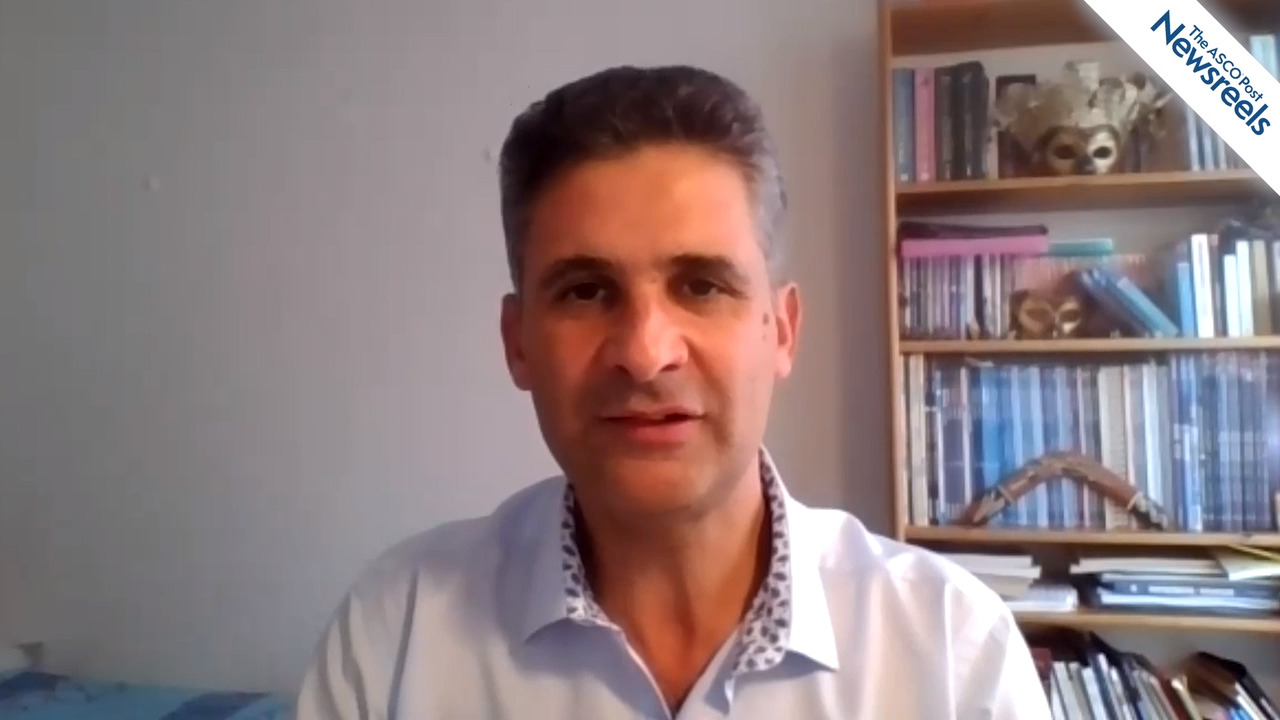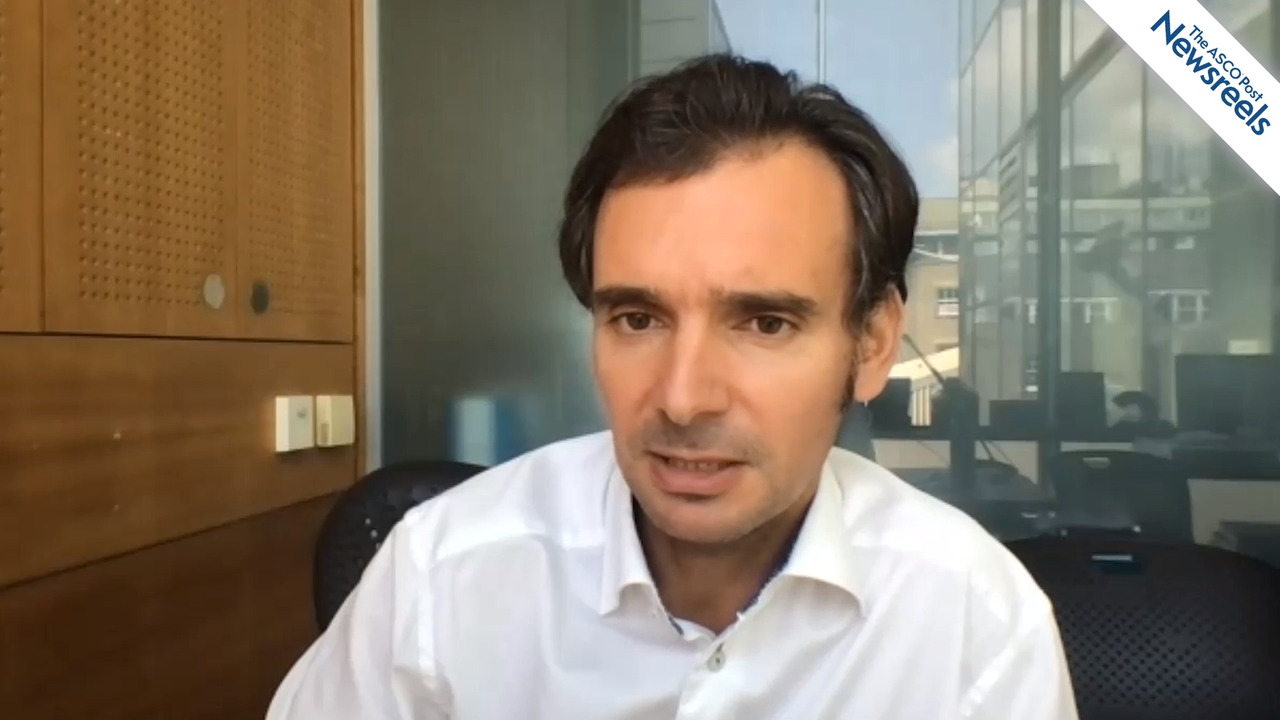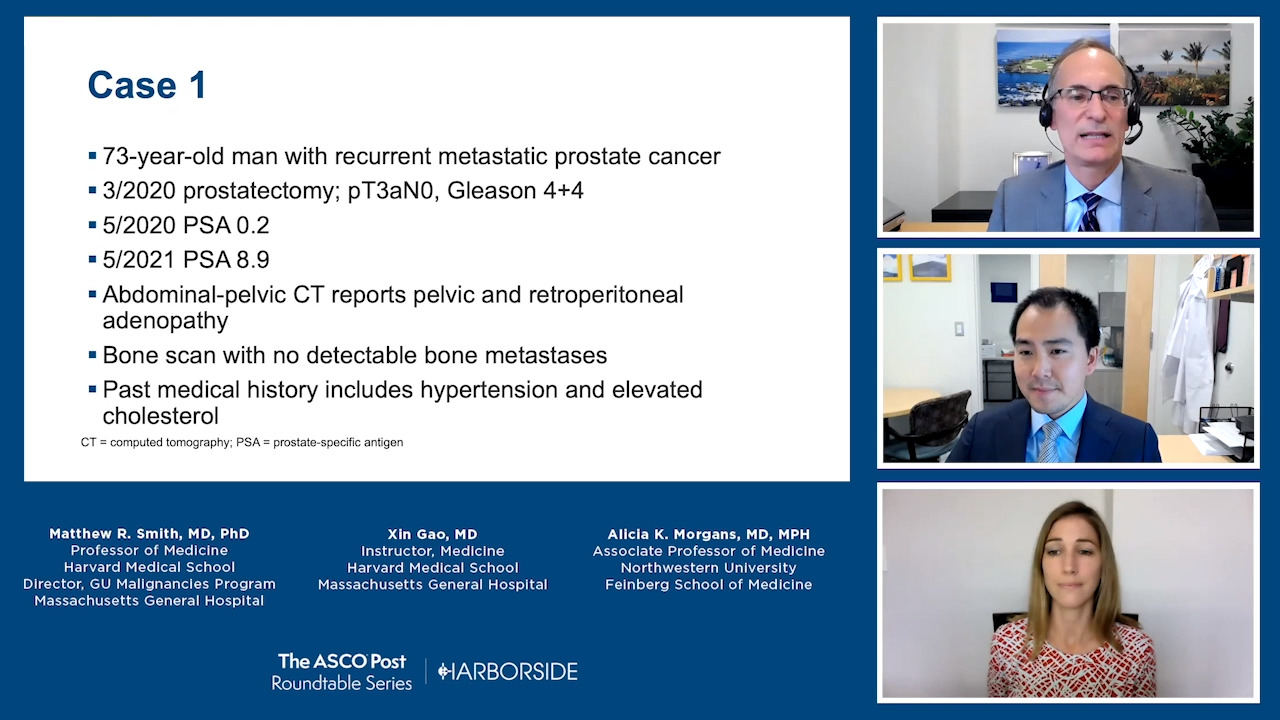Expert Point of View: Eleni Efstathiou, MD
Invited discussant of the PEACE-1 trial, Eleni Efstathiou, MD, of the Houston Methodist Cancer Center and Athens Medical Center, Greece, reminded listeners: “Androgen signaling inhibition is the prevailing therapeutic strategy in advanced prostate cancer, with reproducible outcomes. Many studies...
PEACE-1: Abiraterone Plus Androgen-Deprivation Therapy and Docetaxel Boosts Survival in Metastatic Castration-Sensitive Prostate Cancer
The addition of abiraterone acetate plus prednisone on top of androgen-deprivation therapy plus docetaxel improved survival in patients with de novo metastatic castration-sensitive prostate cancer vs androgen-deprivation therapy plus docetaxel alone. These results were from the phase III PEACE-1...
ACIS Trial: Addition of Apalutamide to Abiraterone Acetate/Prednisone for Metastatic Castration-Resistant Prostate Cancer
As reported in The Lancet Oncology by Fred Saad, MD, FRCS, and colleagues, the phase III ACIS trial has shown that the addition of apalutamide to abiraterone acetate and prednisone significantly prolonged radiographic progression–free survival in men with metastatic castration-resistant prostate...
FDA Pipeline: Recent Reviews, Designations, Applications, and Authorizations in the Oncology Space
Over the past month, the U.S. Food and Drug Administration (FDA) issued several regulatory decisions for novel treatments for patients with cancer. Priority Review for Relatlimab and Nivolumab Fixed-Dose Combination in Unresectable or Metastatic Melanoma The FDA accepted for Priority Review the...
ARAMIS Analysis: Darolutamide Shows Similar Benefits for Black Patients as Observed in the Overall Population
Black patients with prostate cancer who were treated with the androgen receptor inhibitor darolutamide had clinical outcomes similar to those observed in the overall clinical trial population, according to results from the phase III ARAMIS trial presented by Neal Shore, MD, at the 14th AACR...
Adding Value to Clinical Decision-Making in Nonmetastatic Castration-Resistant Prostate Cancer
Several recent investigations have led to the U.S. Food and Drug Administration (FDA) approval of novel antiandrogens to treat nonmetastatic castration-resistant prostate cancer. Yet, this work has not addressed the treatment of nonmetastatic hormone-sensitive biochemically recurrent prostate...
Characteristics of and Outcomes in Luminal and Basal Subtypes of Metastatic Castration-Resistant Prostate Cancer
In a retrospective cohort study reported in JAMA Oncology, Aggarwal et al found that metastatic castration-resistant prostate cancer could be categorized into luminal and basal subtypes, and that androgen-signaling inhibitor treatment was associated with better outcomes in patients diagnosed with...
Ga-68 PSMA-11 PET for Detection of Pelvic Nodal Metastasis in Intermediate- to High-Risk Prostate Cancer
In a collaborative phase III trial reported in JAMA Oncology, Thomas A. Hope, MD, and colleagues found that gallium-68 prostate-specific membrane antigen–11 positron-emission tomography (Ga-68 PSMA-11 PET) had 40% sensitivity and 95% specificity in the detection of pelvic nodal metastases prior to...
PEACE-1 and STAMPEDE Trials: Abiraterone Acetate Plus Prednisolone in Prostate Cancer
A novel combination of well-known drugs may prolong survival in patients with prostate cancer, according to late-breaking research presented at the European Society for Medical Oncology (ESMO) Congress 2021. The PEACE-1 and STAMPEDE studies found that the addition of abiraterone acetate plus...
Karim Fizazi, MD, PhD, on Prostate Cancer: Newly Reported Survival Rates With Abiraterone, Docetaxel, and Prednisone
Karim Fizazi, MD, PhD, of the Institut Gustave Roussy, discusses phase III results from the PEACE-1 study, which showed that androgen-deprivation therapy plus docetaxel and abiraterone provided 2.5 years of additional time without radiographic disease progression or death and 1.5 additional years of survival in men with de novo high-volume metastatic castration-sensitive prostate cancer (Abstract LBA5).
Gerhardt Attard, MD, PhD, on Prostate Cancer: Abiraterone and Prednisolone in the STAMPEDE Protocol
Gerhardt Attard, MD, PhD, of The Royal Marsden NHS Foundation Trust, discusses findings that show 2 years of abiraterone acetate plus prednisolone-based treatment improves metastasis-free and overall survival in men with high-risk nonmetastatic prostate cancer. The data suggest this combination regimen might be considered a new standard of care (Abstract LBA4).
VISION Trial: Novel PSMA-Targeted Radiotherapy Improves Outcomes in Metastatic Prostate Cancer
Lutetium-177–PSMA-617 (LuPSMA)—an investigational radiolabeled small molecule—significantly improved radiographic progression-free survival and overall survival when added to the standard of care compared with the standard of care alone for men with metastatic castration-resistant prostate cancer...
Novel Urine-Based Test Evaluated in Prostate Cancer Detection and Risk Stratification
In a validation study with data presented at the American Urological Association’s 2021 Annual Meeting, clinician-researchers reported that a new test (miR Sentinel PCC4 Test) may be able to detect and risk-classify prostate cancer at the molecular level with predictive accuracy based on a single...
Racial Disparities Among Men With Prostate Cancer
Despite great strides in prostate cancer treatment over the past several years, racial disparities in care persist, according to new data presented during the 2021 Annual Meeting of the American Urological Association (AUA). Three studies highlighting this topic were presented during a virtual...
TITAN Confirms Survival Benefit of Apalutamide Plus ADT in Metastatic Prostate Cancer: Now, Move Therapy Forward
As reported in the Journal of Clinical Oncology by Chi et al1—and summarized in this issue of The ASCO Post—the prespecified final overall survival analysis of the phase III TITAN trial1-3 has confirmed a clear overall survival and radiographic progression-free survival benefit with the combination ...
Lutetium-177–PSMA-617: A First-in-Class Radioligand Therapeutic in Metastatic Prostate Cancer
Based on the findings of the phase III VISION trial, reported by Sartor et al1 and summarized in this issue of The ASCO Post, lutetium-177–PSMA-617 (LuPSMA) is the first of the prostate-specific membrane antigen–targeted cancer theranostics to demonstrate a survival-prolonging benefit for men with...
Adding LuPSMA to Standard Care Improves Outcomes in Castration-Resistant Prostate Cancer
As reported in The New England Journal of Medicine by Oliver Sartor, MD, of the School of Medicine, Tulane University, and colleagues, the phase III VISION trial has shown prolonged progression-free and overall survival with lutetium-177–PSMA-617 (LuPSMA) radioligand therapy plus standard care vs...
Maintained Benefit of Apalutamide Plus Androgen-Deprivation Therapy Shown in Metastatic Castration-Sensitive Prostate Cancer
As reported in the Journal of Clinical Oncology by Kim N. Chi, MD, of BC Cancer and Vancouver Prostate Centre, and colleagues, the final overall survival analysis of the phase III TITAN trial showed significant benefit of apalutamide plus androgen-deprivation therapy vs placebo plus...
Effect of High-Intensity Interval Training on Biochemical Progression in Patients With Localized Prostate Cancer Under Active Surveillance
In a Canadian single-institution phase II study (ERASE) reported in JAMA Oncology, Kang et al found that increased exercise in the form of high-intensity interval training was associated with increased cardiorespiratory fitness and reductions in prostate-specific antigen (PSA) level, PSA velocity,...
Prostate Cancer Diagnostics: Novel Approaches Are Leaving Conventional Imaging Behind
Advances in molecular imaging are having a big impact on prostate cancer management and outcomes, according to Ashesh B. Jani, MD, the James C. Kennedy Professor in Prostate Cancer, Department of Radiation Oncology at the Winship Cancer Institute of Emory University, Atlanta. Dr. Jani described his ...
Prostate Cancer Screening Using the Stockholm3 Screening Test With MRI-Guided Biopsy
In a Swedish prostate cancer screening trial (STHLM3-MRI) reported in The Lancet Oncology, Nordström et al found that use of the Stockholm3 screening test together with magnetic resonance imaging (MRI)-guided biopsy reduced overdetection of disease while preserving the ability to detect clinically...
Study Examines Association Between Benign Prostatic Hyperplasia and Prostate Cancer
A team of researchers studied the relationship between benign prostatic hyperplasia (BPH) and prostate cancer in 405 men by quantitatively looking at different parts of the prostate tissue on magnetic resonance imaging (MRI). Findings from their analysis were published by Nandalur et al in the...
Talazoparib in Patients With Metastatic Castration-Resistant Prostate Cancer and DNA Repair Gene Alterations
In the phase II TALAPRO-1 trial reported in The Lancet Oncology, Johann S. de Bono, PhD, and colleagues found that monotherapy with the poly (ADP-ribose) polymerase (PARP) inhibitor talazoparib produced durable responses in patients with metastatic castration-resistant prostate cancer and DNA...
Causes of Death Among Men Diagnosed With Metastatic Prostate Cancer
In a retrospective cohort study using Surveillance, Epidemiology, and End Results (SEER) data reported in JAMA Network Open, Elmehrath et al found that a substantial proportion of men diagnosed with metastatic prostate cancer between 2000 and 2016 in the United States died from causes unrelated to...
Evaluation of Baseline Cancer Mortality Risk in Medicaid Expansion and Nonexpansion States
In a study of National Cancer Database data reported in a research letter in JAMA Oncology, Salazar et al found little difference in baseline cancer mortality rates between U.S. states that expanded Medicaid enrollment and nonexpansion states prior to expansion in 2009 and immediately following...
Salvage and Adjuvant Radiotherapy After Radical Prostatectomy for Prostate Cancer: What’s ‘Just Right’ for Our Patients?
In the storied English fable “Goldilocks and the Three Bears,” a child enters a home and tastes three bowls of porridge. She prefers a bowl that is not too cold and not too hot but one that has just the right temperature. This “Goldilocks principle” of “just the right amount” can be applied to the...
Mortality Risk With Adjuvant vs Early Salvage Radiotherapy in Men With Adverse Pathology at Radical Prostatectomy for Prostate Cancer
In a retrospective cohort study reported in the Journal of Clinical Oncology, Derya Tilki, MD, of Martini-Klinik Prostate Cancer Center, University Hospital-Hamburg-Eppendorf, Hamburg, and colleagues found that adjuvant radiotherapy was associated with reduced risk for all-cause mortality vs early...
Adding Short-Term Androgen Suppression to Radiotherapy for Patients With Localized Intermediate-Risk Prostate Cancer: Long-Term Findings
As reported in the Journal of Clinical Oncology by Bolla et al, a 12-year analysis among patients with localized intermediate-risk prostate cancer in the EORTC 22991 trial showed improved event-free and disease-free survival with the addition of 6 months of concomitant and adjuvant androgen...
Second-Generation Androgen Receptor Inhibitors for Older Men With Nonmetastatic Castration-Resistant Prostate Cancer
In a U.S. Food and Drug Administration pooled analysis of clinical trial patient-level data reported in The Lancet Oncology, Fallah et al found that second-generation androgen receptor inhibitor treatment was associated with survival benefits in patients aged 80 years or older with nonmetastatic...
Prostate Cancer Surgery Rates in Black vs White Men With Nonmetastatic Disease During the COVID-19 Pandemic
In a retrospective cohort study reported in JAMA Oncology, Bernstein et al found that prostatectomy rates during the initial wave of the COVID-19 pandemic were dramatically lower among Black men vs White men with previously untreated nonmetastatic prostate cancer. Study Details The study involved...
Bone-Protecting Agents Shown to Reduce Fracture Rate in Men With Metastatic Prostate Cancer
Prostate cancer experts have often stated it is important to add a bone-protecting agent for patients on treatment for metastatic castration-resistant prostate cancer. Recent evidence in support of this recommendation comes from a study presented during the 2021 ASCO Annual Meeting, confirming a...
Nomograms for Predicting Outcomes With LuPSMA Therapy in Metastatic Castration-Resistant Prostate Cancer
In a retrospective study reported in The Lancet Oncology, Gafita et al developed nomograms for predicting overall survival and prostate-specific antigen (PSA) progression-free survival outcomes in men receiving lutetium-177–PSMA (LuPSMA) treatment for metastatic castration-resistant prostate...
Addition of AKT Inhibitor Ipatasertib to Abiraterone/Prednisolone in Metastatic Castration-Resistant Prostate Cancer With PTEN Loss
In the phase III IPATential150 trial reported in The Lancet, Christopher Sweeney, MD, and colleagues found that the addition of the AKT inhibitor ipatasertib to abiraterone and prednisolone produced a significant improvement in progression-free survival among patients with metastatic...
MRI-Targeted vs Standard Biopsy for Prostate Cancer Screening in Men With Elevated PSA Levels
In a Swedish population-based noninferiority trial (STHLM3-MRI) reported in The New England Journal of Medicine, Eklund et al found magnetic resonance imaging (MRI)-targeted biopsy was noninferior to standard biopsy in detecting clinically significant cancers in men with elevated prostate-specific...
PSMA PET-Positive Metastatic Castration-Resistant Prostate Cancer
In this video, Drs. Matthew R. Smith, Xin Gao, and Alicia K. Morgans discuss the emerging role of PSMA (prostate-specific membrane antigen)-targeted therapy in metastatic castration-resistant prostate cancer. Dr. Smith presents a case of a 67-year-old man with metastatic castration-resistant prostate cancer who experienced disease progression following abiraterone acetate plus prednisone and subsequent treatment with docetaxel, as well as extensive bone metastases and para-aortic adenopathy on PSMA-PET/CT. The faculty discuss the implications of the recent phase III VISION trial of 177Lu-PSMA-617 and the adverse events associated with this novel radioligand therapy.
Metastatic Castration-Resistant Prostate Cancer and DNA Repair Gene Alterations
In this video, Drs. Matthew R. Smith, Xin Gao, and Alicia K. Morgans discuss the role of PARP inhibitors in the treatment of metastatic castration-resistant prostate cancer and homologous recombination repair deficiency, focusing on data from the PROfound trial. Dr. Smith presents a case of a 67-year-old man with metastatic castration-resistant prostate cancer who experienced disease progression despite treatment with enzalutamide, and the faculty discuss the use of docetaxel vs olaparib when tumor genomic testing reports pathogenic mutations in BRCA2 or ATM.
High-Volume De Novo Metastatic Castration-Sensitive Prostate Cancer
In this video, Drs. Matthew R. Smith, Xin Gao, and Alicia K. Morgans discuss the management of metastatic castration-sensitive prostate cancer, focusing on data from the phase III PEACE-1 trial. The faculty present the case of a 61-year-old man with de novo metastatic high-volume castration-sensitive prostate cancer and extensive bone metastases, discussing the appropriateness of adding docetaxel or abiraterone acetate to androgen-deprivation therapy.
Low-Volume Recurrent Metastatic Castration-Sensitive Prostate Cancer
In this video, Drs. Matthew R. Smith, Xin Gao, and Alicia K. Morgans discuss the management of metastatic castration-sensitive prostate cancer, focusing on data from the phase III TITAN trial. The faculty present the case of a 73-year-old man with recurrent, low-volume/low-risk metastatic castration-sensitive prostate cancer and emphasize the importance of considering the addition of novel hormonal therapies to androgen-deprivation therapy for the treatment of such patients.
Addition of Docetaxel to Radiotherapy and ADT in Nonmetastatic Unfavorable-Risk Prostate Cancer
In a phase III trial reported in the Journal of Clinical Oncology, Anthony V. D’Amico, MD, PhD, and colleagues found that the addition of docetaxel to radiotherapy and androgen-deprivation therapy (ADT) did not improve overall survival in nonmetastatic, unfavorable-risk prostate cancer. However,...
Identification of Prognostic Transcriptional Profile in CTCs With Multiplex Liquid Biopsy in Metastatic Prostate Cancer
In a study reported in the Journal of Clinical Oncology, Sperger et al found that use of a novel liquid biopsy technology resulted in identification of a prognostic transcriptional profile in circulating tumor cells (CTCs) from patients with metastatic prostate cancer. The profile was prognostic...
Expert Point of View: Mary-Ellen Taplin, MD
Invited discussant of the VISION trial, Mary-Ellen Taplin, MD, of Dana-Farber Cancer Institute, Boston, commented on the study, noting that she was a co-investigator of the trial. “Patients with metastatic castration-resistant prostate cancer have a number of treatment options. There are 10...
VISION Trial: Novel PSMA-Targeted Radiotherapy Improves Outcomes in Metastatic Prostate Cancer
Lutetium-177–PSMA-617 (LuPSMA)—an investigational radiolabeled small molecule—significantly improved radiographic progression-free survival and overall survival when added to the standard of care compared with the standard of care alone for men with metastatic castration-resistant prostate cancer...
Study Investigates Influence of Race on Receipt of Care for Prostate Cancer
Black men most likely to benefit from advanced prostate cancer therapies are 11% less likely to receive them than non-Black men. This happens despite apparent equal opportunities in obtaining health-care services, a new study focused on American veterans has shown. Disparities Exposed Published by...
Reducing Prostate Cancer Disparity by Bringing Care to Underserved Populations
The dire cancer incidence and mortality statistics for Black patients compared with White patients are well known. Collectively, Black individuals have the highest mortality rate and shortest survival of any racial or ethnic group in the United States for most cancers. Black men also have the...
Immunotherapy May Be Effective for Subset of Patients With Prostate Cancer
In recent years, cancer immunotherapy has been effective in treating patients with immunogenic—or “hot”—tumors with increased levels of inflammation and the presence of immune cells in and around the tumors. Prostate cancer, however, is considered a “cold” tumor, with few immune cells recognizing...
VISION Trial: Lu-177–PSMA-617 Radioligand Therapy Prolongs Survival When Added to Standard of Care in Metastatic Castration-Resistant Prostate Cancer
As reported in The New England Journal of Medicine by Oliver Sartor, MD, and colleagues, the phase III VISION trial has shown prolonged progression-free and overall survival with lutetium-177–PSMA-617 (Lu-177–PSMA-617) radioligand therapy plus standard care vs standard care alone in previously...
FDA Pipeline: Priority Reviews in Multiple Myeloma, Cervical Cancer, Neutropenia, and Myelofibrosis
Over the past month, the U.S. Food and Drug Administration (FDA) has granted Priority Review to therapies for multiple myeloma, cervical cancer, chemotherapy-induced neutropenia, and myelofibrosis. The FDA also granted a number of Breakthrough Therapy designations, including those for treatments in ...
Neeraj Agarwal, MD, on Treatment Patterns and Disparities in Patients With Prostate Cancer
Neeraj Agarwal, MD, of Huntsman Cancer Institute at the University of Utah, discusses three studies that examined real-world treatment patterns and utilization of advanced therapies in men with metastatic castration-sensitive prostate cancer, which served to highlight the ways in which Black men may be treated differently (Abstracts 5072, 5073, 5704).
Neeraj Agarwal, MD, on Prostate Cancer: Androgen-Deprivation Therapy With Orteronel or Bicalutamide
Neeraj Agarwal, MD, of Huntsman Cancer Institute at the University of Utah, discusses phase III data from the SWOG S1216 trial, which evaluated the clinical benefit of using androgen-deprivation therapy with either orteronel (or TAK-700, a CYP17 inhibitor) or bicalutamide in patients with newly diagnosed metastatic hormone-sensitive prostate cancer (Abstract 5001).
Peter C. Black, MD, on Prostate Cancer Health-Care Disparities: Expert Perspective
Peter C. Black, MD, of the Vancouver Prostate Centre, University of British Columbia, reviews three studies on early detection and treatment of Black patients with prostate cancer: a large-scale analysis of genomic profiling; the use of PSA screening; and integrating a patient-specific genomic classifier to improve risk classification and treatment recommendations for Black men (Abstracts 5003, 5004, and 5005).









